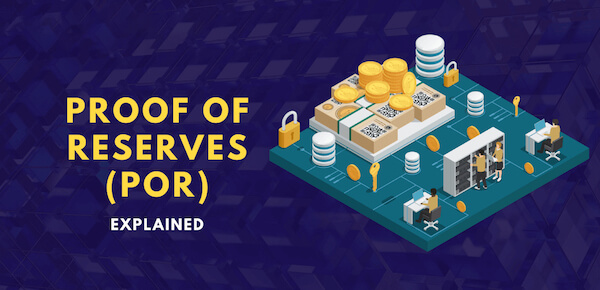Categories: General Information
What is Proof of Reserve (PoR)? Ensuring Trust and Transparency in Cryptocurrency
Uncover the power of Proof of Reserve (PoR) in cryptocurrencies, ensuring trust and transparency. Explore what is Proof of Reserve (PoR), the process, its role in fostering confidence, benefits, and asset safeguards.
Cryptocurrencies have gained significant popularity in recent years, offering a decentralized and secure alternative to traditional financial systems. However, concerns about the verifiability of reserves held by cryptocurrency exchanges and custodians have raised questions about their trustworthiness. This is where Proof of Reserve (PoR) comes into play. In this blog post, we will explore what is Proof of Reserve, how it is conducted, its importance, its benefits, and how it works.
Table of Contents
What is Proof of Reserve (PoR)?

Proof of Reserve is a cryptographic method used to verify and validate the reserve holdings of cryptocurrency custodians, exchanges, or other financial institutions. It provides transparency by offering proof that the entity holds the assets it claims to have. This mechanism assures users that their digital assets are backed by sufficient reserves and protects against fraudulent practices such as fractional reserve banking.
How is a PoR Conducted?
To conduct a Proof of Reserve, a custodian or exchange must demonstrate that it holds enough assets to cover its liabilities. This can be done using different approaches, including:
- On-Chain Verification: This method involves publishing cryptographic proofs on the blockchain that allow anyone to independently verify the reserve holdings. These proofs can be in the form of Merkle trees, commitments, or cryptographic accumulators.
- Audit by a Trusted Third Party: Another approach is to engage a reputable third-party auditor to verify the reserve holdings. The auditor performs a detailed examination of the institution's financial statements, transactions, and reserve balances to ensure they match the claims made.
Importance of Proof of Reserve

Proof of Reserve serves as a critical safeguard for cryptocurrency users and investors. It promotes trust and transparency by eliminating doubts about whether an exchange or custodian possesses the reserves it claims to have. By providing a verifiable record of holdings, PoR reduces the risk of insolvency, protects against mismanagement, and increases confidence in the overall cryptocurrency ecosystem.
Benefits of Proof of Reserve
The implementation of Proof of Reserve offers several benefits, including:
Enhanced Trust: Proof of Reserve instills a sense of confidence and trust in cryptocurrency users. By providing verifiable proof of reserve holdings, it mitigates the risk of fraudulent practices and insolvency, assuring users that their assets are properly backed.
Transparency: PoR promotes transparency by enabling users to independently verify the reserve holdings of custodians and exchanges. This transparency reduces information asymmetry and encourages responsible financial practices within the cryptocurrency industry.
Regulatory Compliance: Implementing Proof of Reserve helps exchanges and custodians demonstrate compliance with regulatory requirements. By maintaining adequate reserves and providing evidence of their holdings, they create a more favorable environment for cryptocurrency adoption and regulatory acceptance.

Financial Stability: Proof of Reserve acts as a safeguard against mismanagement and potential financial instability. It ensures that cryptocurrency service providers maintain sufficient reserves, reducing the risk of sudden insolvency or losses for users.
Industry Integrity: By implementing PoR, the cryptocurrency industry showcases its commitment to transparency and accountability. It enhances the industry's reputation and promotes responsible behavior among custodians, exchanges, and other financial institutions operating within the ecosystem.
Working of Proof of Reserve
The working of Proof of Reserve involves maintaining a clear and auditable record of reserve holdings. This can be achieved through a combination of cryptographic proofs, transparent reporting, and independent audits. By making reserve data accessible and verifiable, PoR ensures accountability and helps prevent practices that could jeopardize the financial stability of cryptocurrency service providers.
Cryptocurrency Exchanges Using Proof of Reserve
As of my knowledge cutoff in September 2021, Proof of Reserve (PoR) is a mechanism used by some cryptocurrency exchanges to provide transparency and verifiable proof that they hold sufficient reserves of digital assets to cover customer deposits. PoR is a way to assure users that the exchange has the funds it claims to have and is not operating as a fractional reserve system.
While there are exchanges that claim to use Proof of Reserve, the adoption of this mechanism can vary, and it's essential to verify the information from the exchange's official sources or relevant announcements. Additionally, the landscape of cryptocurrency exchanges is continually evolving, and new exchanges may adopt PoR or other transparency measures beyond my knowledge cutoff date.
One notable example of an exchange that has adopted Proof of Reserve is Kraken. Kraken introduced the Proof of Reserves page, allowing users to verify the total amount of funds held by the exchange, attested by cryptographic proof. By providing a cryptographic proof of reserves, Kraken seeks to enhance transparency and build trust with its users.
It's important to note that not all exchanges may choose to implement PoR or disclose their reserve practices openly. As a user, you can research and consider exchanges that prioritize transparency, security, and regulatory compliance to make informed decisions about where to trade and store your cryptocurrencies. Always conduct due diligence and verify the claims made by exchanges to protect your assets and privacy.
Conclusion
Proof of Reserve (PoR) is a crucial mechanism for ensuring trust and transparency in the cryptocurrency industry. By verifying the reserve holdings of custodians and exchanges, it safeguards user assets and strengthens the overall integrity of the ecosystem. As the cryptocurrency market continues to evolve, understanding what is Proof of Reserve and its significance will play an increasingly important role in building confidence among users, regulators, and the broader financial community. Follow U2U for more blockchain information.
